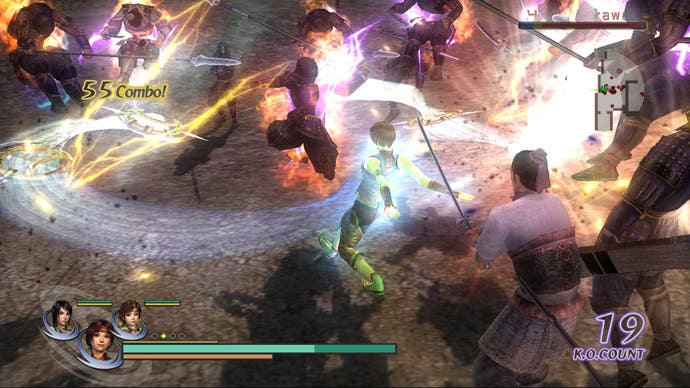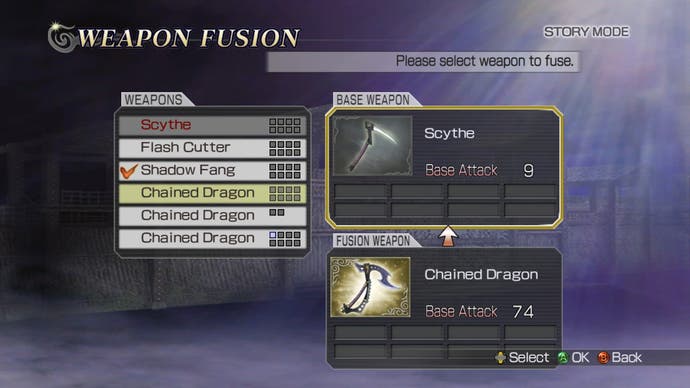Warriors Orochi
Not Orochi it's cracked up to be.
If you're one of those people who remain resolutely nonplussed by Koei's Warriors series you can move along now. There's nothing to see here. Warriors Orochi is unlikely to convert you to the joys of Byzantine genealogies, shoddy voice-acting and button-bashing-filled battlefields. If you're not one of those people, well, you'll probably be wondering where Orochi fits in to the series: what new nuances it brings and how they affect the finely honed balance between battlefield strategy and button-bashing combat that Koei has pioneered. Read on.
The game is, essentially, a mash-up between Samurai Warriors and Dynasty Warriors. It's been made possible thanks to the nefarious evil of the Serpent King Orochi, who has created a rift in the space-time continuum to test himself against warriors from each era (which is, of course, depicted in a characteristically cutting-edge cut-scene intro). It incorporates practically all the playable characters from both games across four campaigns, with maps and features that will be familiar to fans of either series. And all of the hallmarks are there - from the dizzyingly silly techno soundtrack and comedy voice-acting, to the countless numbers of combatants and constant ebb and flow of battle.

The thing that sets it apart from each series - the new gimmick - is the 'team battle system'. Which basically means that you pick a team of three fighters and switch between them whenever you like during battles. While team members aren't fighting, their signature musou moves, and their health, are recharged. It means that it's possible to wreak even more destruction than before, by switching between characters to chain Musou attacks, and it's possible to keep going for longer, by switching between characters to recover health. The other big new thing is a weapon fusion system that allows you to combine weapons to create more powerful ones.
The problem with the latter feature is that it's under-powered until you start picking up the most powerful weapons. Why go to the bother of fusing weapons when next mission you can pick up a new weapon that's so much more powerful than the two combined? The simple answer is that you don't have to bother. You can just choose not to fuse any weapons and it'll be like it was never there. It's more difficult, however, to ignore the flaws with the former feature: because the team battle system is not all it's cracked up to be.
The most dramatic upshot of the feature is that combat now gets more intense than ever before. Battles are now composed of a series of intense flashpoints: almost every mission features at least one set-piece that surrounds you with multiple enemy officers, where switching between characters becomes an essential survival strategy. While that does make the combat histrionics even more heroic and intense than ever before, it also gets a bit confusing, especially if you find yourself buffeted by a succession of special attacks. More seriously, it seems to lessen the emphasis on battlefield strategy - on reading and reacting to the ebb and flow of battle. The missions in Orochi seem much more straightforward by comparison to other games in the series.

The other drawback with the team battle system is that it makes players so highly powered that protecting NPCs becomes even more prominent than in other Warriors games. And boy is it frustrating when you're more powerful than ever before to fail a mission because your general can't defend himself - especially if you've spent a good twenty minutes reaching the game's cheapo final boss. And is it really too much to expect a next-gen title to allow you to invert the camera axes?
So those are the drawbacks. What about the positives? Well the positives are that it's another new Warriors game. It might not be the best of them, but you're not going to find too many games like them anywhere else. It's certainly not as smart, or as entertaining, as the more cerebral, if sedate, combination of action and strategy in other Warriors titles. But as an amuse bouche between the last round of Warriors games and the next one it works fine, serving up just enough novelty to pep up the classic Warriors recipe, while leaving you eager to taste the hopefully meatier delights of Dynasty Warriors 6 next year. It's just a shame that compared to the innovative excellence of Koei's other battlefield titles like Bladestorm or Gundam Musou, or even just Samurai Warriors 2, Warriors Orochi falls a little short.
